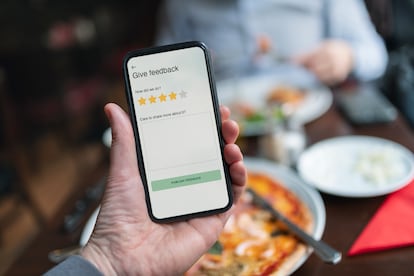How was your experience? How the internet is forcing us to rate everything with stars
There’s a practical side to giving one to five stars on a website, since it creates more transparency between companies and users. The downside is that users are also collaborating with the unstoppable data market that has turned the internet into an enormous resource for surveillance and control

A takeaway food delivery driver rejects the tip before seeing it: “It’s much better to receive a reply — positive, of course — from the survey that the customer will get by email.” A writer offers a gift (another of his books) to anyone who writes a positive review about his latest novel. A hotel insists its guests publicly rate their stay, even — the machine does not discriminate — those who complained several times and were dissatisfied, and then there’s Tinder. Tinder, like all the other dating applications, does not show the assigned score to each profile, but although no one — except its developers — really knows how its algorithm works, it is clear that that number (or that matrix full of them) exists and will determine the user’s path through the application.
Although the image of the teacher armed with a red pen who corrects exams and grades their students still weighs heavy in the collective consciousness, the majority of evaluations today take place in front of a screen or inside a server. There are, therefore, two types: opaque evaluations, such as those that credit institutions use, or the ones that dating websites use and that have not yet dared to ask for reviews from previous dates; and those that we carry out ourselves, becoming judges and critics of each of our experiences. As the philosopher Michel Foucault anticipated in Discipline and Punish (1975), beyond school we will continue to be subjected to continuous, more or less explicit examinations. And as Shoshana Zuboff has more recently developed in The Age of Surveillance Capitalism (2020), the trend will go further. Our digital files include a text that is designed to “evaluate, categorize, and predict our behavior in millions of ways that we can neither know nor combat.”
Accuracy and confidence: visible evaluations

Each device that is connected to the internet collects its user’s habits in the form of data which it will later use to make comparisons and predictions. That is, whenever we are online, consciously or unconsciously, we will be issuing and receiving evaluations.
Víctor Balcells is an expert in web positioning and author. He considers that unconscious metrics are more important for Google than reviews written by users. “I’m referring to browsing data like scrolling behavior or the time it takes to leave a page.” Of course, he specifies, “in local businesses such as the neighborhood hardware store, the part in which the evaluations are integrated is essential and takes priority, since what the search engine will return will be cards with information on the store including maps, scores, and telephone numbers. So, conscious bad reviews have a relevant impact for any website, but especially for local businesses.”
“For companies, digital image work is obsessive and very detailed — much more than analogue work — thanks to the metrics they accumulate,” Balcells continues. And, regarding the internal functioning of these companies, what marketing specialist Puri Vicente recommends is “active listening,” in other words, analyzing everything that is received from users. “I am a firm believer in company-client communication because, if it is properly handled, a bad review can become something positive. In these cases, the client expects a reaction from the company in question.”
Although all experts agree that rating systems for products and services are an opportunity for the company and the customer to offer and receive better service, the issue is very different when it comes to rating people. Just a month ago, a European agreement was reached on the regulation of Artificial Intelligence and other similar technologies. Within that agreement, social credit systems (those that would give a score to each member of the public based on their behavior, which could then impact that person’s relationship with the government) were classified as “unacceptable risks,” which means they are likely to be banned within the European Union.
However, having a visible score next to our first name, last name, and profile photo is not unthinkable or is something that only happens in competitive video games. On the contrary, it is very common in sales applications such as Vinted or Blablacar, the car sharing platform. Blablacar is an example of a symmetrical rating system that has been working satisfactorily for years because both driver and passengers have the same ability to write about each other after the trip. “The key to Blablacar,” explains Itziar García, the platform’s communications director, “is trust, and that trust is closely linked to the technological element. Through a study we conducted together with Professor Arun Sundararajan, we discovered that users trust other users with positively rated profiles almost as much as friends or family, and more than co-workers or neighbors.”
In Blablacar, the most common thing — almost as a matter of etiquette — is that, if everything goes well and the shared trip ends without a hitch, users exchange maximum points and a few words of courtesy, in almost standardized formulas. The person in charge of the company clarifies that there is always a positive experience behind these clichés and that it is up to each user to pay more attention to the score, the text of the opinions, the level of experience, or even opt only for trips with a “Superdriver,” which is a new category for those who meet certain requirements. And for an evaluation system to be reliable and useful, it must be renewed based on the demands of its users, have more or less public and shared criteria, and measure more than one characteristic or magnitude. If not, it will be offering meaningless figures.
What cannot be rated: taste and imagination

In his essay Distinction: A Social Critique of the Judgment of Taste (1984), the sociologist Pierre Bourdieu demonstrated that the taste or preference for some cultural products over others does not arise spontaneously, but depends on economic, work, or other educational factors. Thus, it is possible that certain evaluations of prestigious objects or experiences indicate more about who they value and their desire to assimilate into the dominant class than about the object itself. Furthermore, Javier Moreno, mathematics teacher and author of El hombre transparente (available only in Spanish), warns: “Measuring through the use of stars or numbers usually obeys the emotional responses of the consumer or client. In most cases there are no explicit evaluation criteria, but rather [the surveys] appeal to the user’s uncritical impression of their level of satisfaction.”
The mathematician and writer maintains that numerical evaluations, both the invisible ones and those we make ourselves, would not be as valuable or significant as they seem because “they always hide a desire for simplification.” He is also concerned “to what extent the weighting equates the general public’s with expert opinions. The judgment of the latter is more detailed and inspired by objective criteria (with which one may or may not agree), so it is vitally important to qualify the numerical grade with a reasoned opinion.”
Balcells goes further and considers that our obsession with measuring everything is affecting the limits of our imagination, since, without realizing it, we would be favoring the exclusion of “the diffuse, the hybrid, and the strange, which is no small thing.” Experience and thought still exceed the ability of computer systems and, Balcells continues, “both metrics and nichification (ordering by categories understandable to robots) kill and restrict the imaginative, demand specificity, and “They do not accept ambiguities.” Furthermore, as users intuit the functioning of the digital filters in charge of disseminating the content they produce, paradoxically, they adapt to them: “In terrible cases like Instagram, the dark, the strange, or the unclassifiable implies receiving bad metrics, so people unconsciously tend to do what is bright, what reveals a lot of skin, and what is fast. I think we have all experienced or sensed it: metrics unconsciously enslave and eliminate the possibility of the imaginative,” says the writer.
Although it is sometimes flattering and many surveys include some type of remuneration (for example, a discount on the next purchase), becoming critics of all our transactions has consequences and a certain cost. On the one hand, we will build healthier, more transparent, and more trusting relationships with some users and platforms. But on the other hand, we will collaborate with the unstoppable data market, both the visible and the invisible, that has turned the internet into an enormous surveillance and control device and that is also beginning to threaten our imagination.
Sign up for our weekly newsletter to get more English-language news coverage from EL PAÍS USA Edition
Tu suscripción se está usando en otro dispositivo
¿Quieres añadir otro usuario a tu suscripción?
Si continúas leyendo en este dispositivo, no se podrá leer en el otro.
FlechaTu suscripción se está usando en otro dispositivo y solo puedes acceder a EL PAÍS desde un dispositivo a la vez.
Si quieres compartir tu cuenta, cambia tu suscripción a la modalidad Premium, así podrás añadir otro usuario. Cada uno accederá con su propia cuenta de email, lo que os permitirá personalizar vuestra experiencia en EL PAÍS.
¿Tienes una suscripción de empresa? Accede aquí para contratar más cuentas.
En el caso de no saber quién está usando tu cuenta, te recomendamos cambiar tu contraseña aquí.
Si decides continuar compartiendo tu cuenta, este mensaje se mostrará en tu dispositivo y en el de la otra persona que está usando tu cuenta de forma indefinida, afectando a tu experiencia de lectura. Puedes consultar aquí los términos y condiciones de la suscripción digital.








































